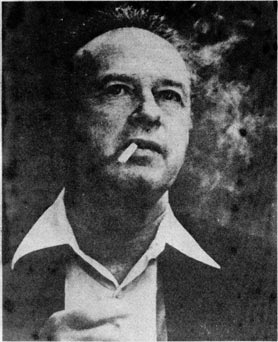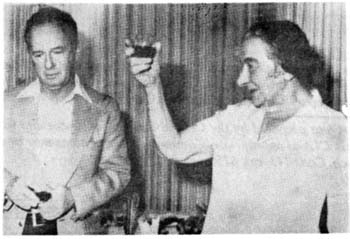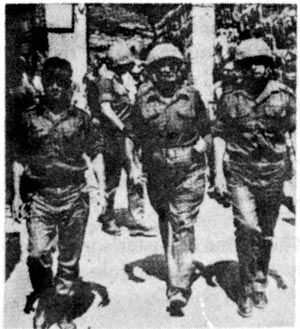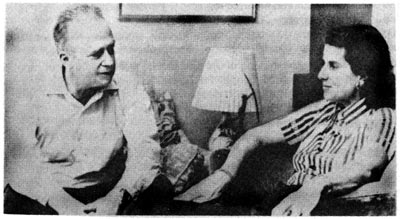
The New Prime Minister
Yitzhak RABIN
BR-74-30, June 1974
Prime Minister of Israel

| ISRAEL | Yitzak RABIN |

|
Because he was Army Chief of Staff during the 1967 Arab-Israeli war, Rabin is a popular public figure, but his political strength comes from his relations with key members of the ruling elite rather than from any organizational power base. The endorsement of Pinchas Sapir, the powerful former Minister of Finance, was crucial to his election. After returning from a 5-year tour as Ambassador to the United States in early 1973, Rabin worked on the 1973 Labor Alignment election campaign. He was first elected to the Knesset on 31 December 1973 as a member of MAPAI (Israel Workers' Party), the ILP's largest faction. Because he had not been involved in the pre-October government, Rabin could not be accused of sharing any responsibility for its shortcomings in the conduct of the October 1973 war. During the war itself Rabin headed Israel's voluntary war loan drive.
In selecting Rabin as its head, the ILP Central Committee chose not to be influenced by charges that he had collapsed in a state of acute anxiety on the eve of the 1967 war. The allegations, contained in a memorandum released by his former Deputy Chief of Staff, Maj. Gen. (Ret.) Ezer Weizman, just before the Central Committee vote, produced a strong negative reaction—Rabin's defenders included leaders of the conservative opposition Likud (Unity) bloc. This account of Rabin's breakdown had been public knowledge for some years, and Rabin readily admits that he asked Weizman to take charge for 24 hours but claims it was only because he was fatigued and needed rest.
Rabin was also accused of accepting fees for personal appearances while he was Ambassador to the United States. In acknowledging this, Rabin stated that the practice was entirely legal and that he had made speeches to explain Israeli policy or for fund-raising purposes without charge.
"The Sons of the Founding Generation . . . "
Rabin represents a marked break with the past generation of Israeli leaders and personifies many changes the public has been clamoring for. He is the first sabra (Israeli-born) Prime Minister, and at 52 he is the youngest. The election process itself was hailed in Israel as a watershed in ILP politics—for the first time the party machinery did not predetermine the outcome; Rabin and his RAFI (Israel Workers' List) opponent, then Information Minister Shimon Peres, ran on a personal basis without reference to their factional affiliation within the ILP ; and voting was by secret ballot. In accepting the nomination Rabin said, "The sons of the founding generation have come of age, and with them, the immigrants who came since national independence . . . a generation that pursues continuity but has its own uniqueness." The businesslike ex-general also admitted that he had, characteristically, prepared two speeches, "just in case."

Outgoing Prime Minister Golda Meir toasts her
successor, Yitzhak Rabin
Military Hawk / Political Dove
Israel's security is more important to Rabin than an actual peace document because he considers security the key to attaining "unconditional recognition" from the Arabs. In his view, Israel has been fighting for recognition as an independent state, not for territory. The new Prime Minister has been characterized as a "military hawk and a political dove"—committed to seeking a negotiated peace but prepared to use force to protect Israel's security. He believes that negotiations with the Arab states will take time and thinks that Israel will have to remain in a state of constant alert for any military exigencies. Pragmatic and less doctrinaire than previous Israeli leaders, Rabin feels that the government must take a chance for peace and show flexibility.
Rabin has little regard for the usefulness of international organizations in peace negotiations. In July 1971 he called the United Naitons a "place of demagogy" and accused it of having played a negative role with regard to Israel for 15 years.
Before the Arab-Israeli conflict of October 1973, Rabin was inclined to believe that Israel could give up most of the occupied territories, retaining only Sharm al-Shaykh and strategic parts of the Golan Heights and the West Bank. Since the war he has publicly advocated partitioning the Sina'i and the Golan Heights into three zones—one under Israeli sovereignty, one with Israeli military presence and one demilitarized but under Arab control.
Rabin favors the return of populated Arab areas of the West Bank to Jordan and the rehabilitation and relocation of refugees, believing that these actions would eventually lead to the "Palestinianization" of Jordan. At the same time, he believes that Israeli civilian settlements on the West Bank are an integral part of Israel. During a March 1974 interview with a British reporter, Rabin said that Israel could not accept a separate Palestinian state. Later, during an off-the-record conversation with the same correspondent, Rabin said he felt that history was moving in the direction of a separate state and Israel might have to move with it. Rabin would like to reach a further settlement with Egypt before beginning any negotiations with Jordan.
The General as Ambassador
Rabin's only diplomatic assignment, that of Ambassador to the United States, was marked by an unprecedented improvement in Israeli-US relations and a corresponding deterioration in his personal relations with then Foreign Minister Abba Eban and the Ministry's hierarchy. In his blunt, unadorned style, Rabin went after his primary objectives in the United States: armaments and economic support for Israel and assurances that the United States would remain a deterrent to the Soviet Union in the Mediterranean. Rabin felt that an Ambassador should help formulate policy, not just implement instructions. He was critical of the Ministry's ceremonial trappings. He often bypassed Eban on important matters to deal directly with the Prime Minister, who credited him with a profound understanding of American politics and a good grasp of Israeli-US relations.
In June 1972 Rabin referred to US Presidential candidates in terms that left no doubt that he thought Richard Nixon would be the best President as far as Israel was concerned. Eban felt that Israel should stay out of US politics. Rabin also alienated some members of the American Jewish establishment by refusing to use them as middlemen in dealing with the US Government. One US official said that Rabin could "appear to be an S.O.B. at times," but that he was an effective one. A highly placed US official credits Rabin with having been "formidable in diplomatic give-and-take, a master of the facts, brilliant in analysis, articulate in presentation and cogent in debate."
"Exodus" Hero
Yitzhak Rabin was born on 1 March 1922 in Jerusalem. He wanted to become a farmer, so he entered Kadoorie College, an agricultural boarding school. Upon his graduation in 1940 Rabin was awarded a scholarship prize from the British High Commissioner of Palestine. Later that year Yigal Alon, a commander of Palmach (shock troops of Haganah, the Jewish underground), recruited him to join that organization. During World War II Rabin fought for the British and saw action in the Vichy French areas of Syria and Lebanon. In 1946, once more with Palmach, he was imprisoned for 6 months by the British on charges of smuggling refugees into Palestine. His exploits during 1947-48, including raids to liberate detainees who had immigrated illegally, inspired many of the episodes in which Leon Uris later cast the fictional character Ari Ben-Canaan in his novel Exodus.
During the Arab-Israeli war of 1948, Rabin commanded the brigade that secured the road to Jerusalem. He was also executive staff officer to Alon, then head of Palmach. At one point during the war in the Negev, Rabin and the late Egyptian President Jamal 'Abd al-Nasir, then an army officer, met, discussed the military situation and shared a bowl of fruit. After the ceasefire, Rabin was a delegate to the Arab-Israeli armistice talks in 1949 on the island of Rhodes. That occasion was supposedly the first time he wore a necktie.
The youngest colonel in the new Israeli Army, Rabin was put in charge of the battalion commanders training school; he also acted as head of operations on the General Staff. After attending the Staff College at Camberley, England, during 1952-53, Rabin was appointed head of military training. He served as commander of the Northern Command from 1956 until 1959, when he became chief of operations of the General Staff. He spent 2 months at a modern weapons familiarization course in Texas in 1960 before returning to Israel to be named Deputy Chief of Staff. In 1964 Rabin was promoted to Chief of Staff of the Israel Defense Forces (IDF). A brilliant military tactician, he presided over the modernization of the IDF and prepared the basic strategy that was successfully used in the 1967 Arab-Israeli conflict.

|
A man who seldom shows emotion, Rabin was deeply affected by his responsibilities in 1967. The strain from the demands made upon him in the tense days prior to the war began to tell on the Chief of Staff; he slept little and smoked continuously. On 23 May Rabin was no longer able to carry out his duties—whether from the mental breakdown claimed by Weizman, the nicotine poisoning reported by his staff, the extreme fatigue he himself admits to, or a combination of all three—and he asked his deputy to take charge. By the evening of the next day, however, Rabin had resumed command, and the ultimate credit for Israel's victory in the June 1967 war is given to the military forces built and led by him.
Strong Belief and Extreme Caution
The Prime Minister's personality has been described as a combination of strong belief and extreme caution. He has a reputation for being introspective, for seeing a problem in the round and for having a tendency to worry, but for acting resolutely once he makes a decision. A stickler for detail and a perfectionist with an encyclopedic memory. Rabin insists that things be done his way when he is convinced he is right, and he personally sees to it that they are. At the same time, he refrains from even commenting on matters with which he is not familiar. In his new post, Rabin, who favors the telephone to correspondence, usually arrives at his office about 7:00 a.m. and works straight through until 11:00 p.m.
An introvert, Rabin is uncomfortable in crowds. He is reserved at social gatherings and does not engage in small talk, although in the company of close friends he is the center of attention, talkative and sociable. When his children were born, Rabin reportedly waited outside the hospital all night, being too shy to enter. He dislikes formality, and open-necked shirts and apple-eating became the symbols of his tenure as Chief of Staff. Rabin abhors offcolor jokes and does not drink alcoholic beverages. Formerly a chain-smoker, he has attempted to curtail the habit. He is an accomplished amateur photographer, and he enjoys action movies but seldom has time to attend them. Immediately after the 1967 war Rabin was awarded an honorary doctorate by Hebrew University. He has also received four honorary degrees from US schools. He likes to swim and play tennis. Rabin speaks fluent English except when he is nervous.
A Fighting Family
Rabin's parents were born in Russia. His father, Nehemia, spent 15 years in the United States before volunteering for service with the Jewish Legion in Palestine during World War I. There he met and married Rosa Cohen, the daughter of a wealthy timber merchant. Both were active in the Jewish labor movement and Haganah; Rosa was a commander in the latter organization. Known as "nurse Rosa," she encouraged Jewish resistance during the Arab riots of 1920 and smuggled arms to Jewish self-defense units. She was also one of the founders of a cooperative banking system. Yitzhak and his sister were often left to their own devices, almost to the point of neglect, but Yitzhak nevertheless adored his mother. She died when he was 17. Nehemia Rabin lived with his daughter Rachel in Kibbutz Manara until his death in 1971.

Yitzhak and Leah Rabin at home.
The Prime Minister's wife, the former Leah Schlossberg, was also active in Palmach, which she joined after graduating from high school in 1947. She was born in Germany and emigrated to Palestine with her family in 1933. An active extrovert, Mrs. Rabin claims it has never occurred to her to be afraid for herself. During her husband's tour as Ambassador to the United States, she would not curtail Embassy activities for fear of possible incidents because, she said, to give terrorists the satisfaction of stopping things would be "too much." A delightfully frank person, Mrs. Rabin has travelled throughout the United States seeking support for the United Jewish Appeal and Israeli bonds. She insists on writing her own speeches. Mrs. Rabin, who likes to play tennis, says the only benefit left from her rigorous Palmach training is that it helps her breathing on the court. Mrs. Rabin speaks fluent German, French and English.
The Rabins are a close family. There are two children—a daughter, Dahlia, in her mid-20's, and a son, Yuval, 19. Dahlia, married to an IDF officer, is expecting her first child. Yuval had just entered military service prior to October 1973 and was said to be very disappointed at being given guard duty instead of a frontline post. Mrs. Rabin's sister, Aviva, is married to Brig. Gen. (Res.) Avraham Yoffe. Yoffe, who has been director of the Nature Reserves Authority since 1964, was elected to the Knesset in December 1973 as a member of the Likud bloc.
This report was prepared by the Central Reference Service and was coordinated within CIA as appropriate.
Classified by 004050. Exempt from general declassification schedule of E.O.11652, exemption category : § 5B(1), (2), and (3). Automatically declassified on : Date Impossible to Determine.